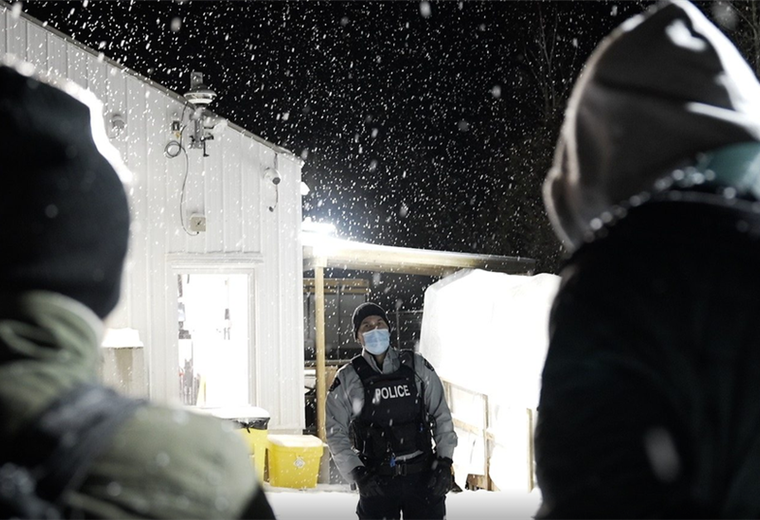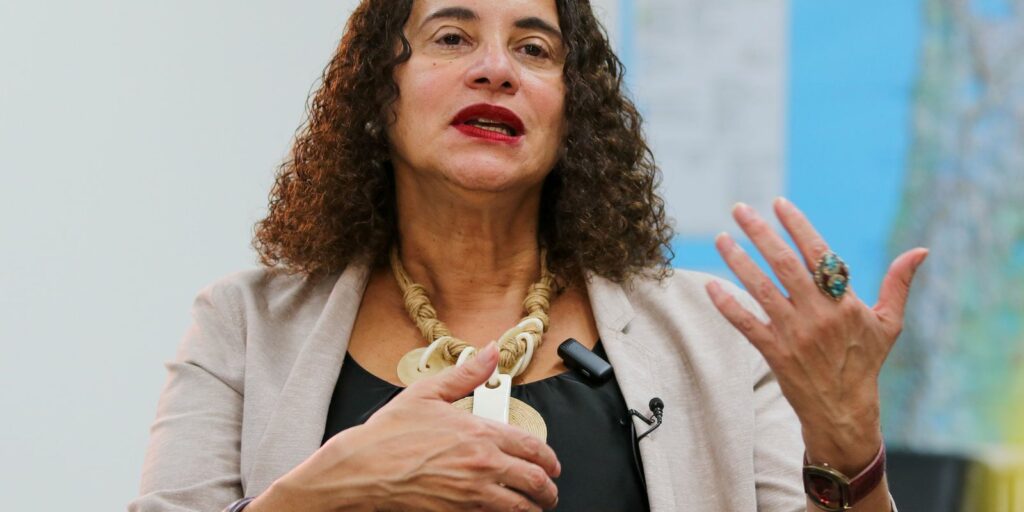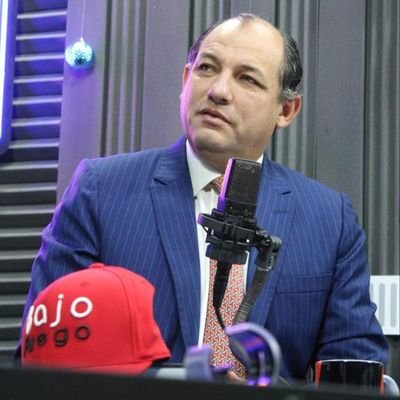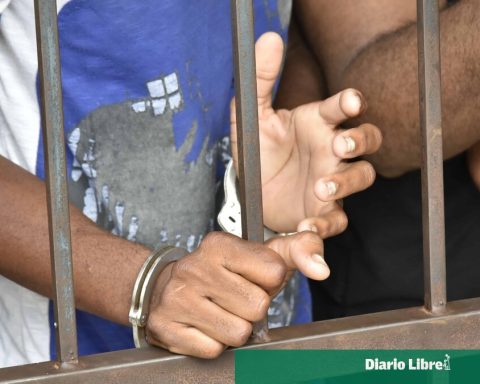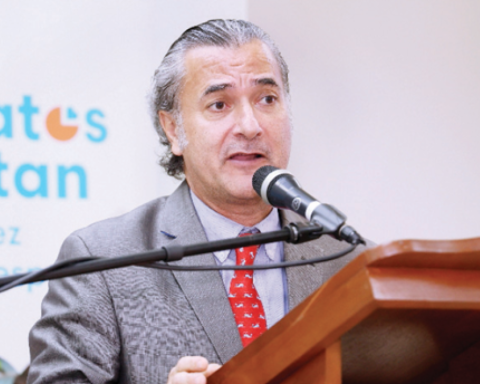March 20, 2023, 3:50 PM
March 20, 2023, 3:50 PM
Last year, nearly 40,000 migrants crossed into Canada to seek asylum at an unofficial border located at the end of a remote rural highway in upstate New York.
This is a record number. Many did so out of the belief that this country will give them a better reception than the United States. But can Canada deal with this influx?
On a snowy winter day, the Roxham road is cold and quiet. The silence is interrupted by the sound of wheels approaching the end of the road, or by footsteps in the snow.
Nearly 150 migrants arrive here every day, with the intention of setting foot in Canada. Many began their journey as far away as Brazil, and this highway in upstate New York is the home stretch.
The roxham road it is not an official border point. There are no border agents at the end of the tour, just police officers who arrest those who cross.
But it has become known as an accessible point of entry into Canada from the US to claim asylum.
Last year saw the largest number of migrants entering Canada through this crossing, drawn by the country’s reputation for helping those fleeing conflict and war.
The influx of migrants has generated growing frustration on both sides of the border, and concerns about the safety of the highway have increased, raising questions about what the future holds for those who make the journey.
The Roxham road aroused national attention in 2017 when a large number of migrants began to cross there.
Some believe that his sudden popularity was due to the fear of being deported from the US under the Trump administration. Others point to a tweet from Canadian Prime Minister Justin Trudeau, which read: “To those fleeing persecution, terror and war, Canadians will welcome welcome“.
The influx of migrants took Canadian authorities by surprise. Montreal’s Olympic Stadium was briefly converted into a hostel for new arrivals. The federal government tried to stem the tide with warnings that arrival in Canada did not mean automatic permission to stay.
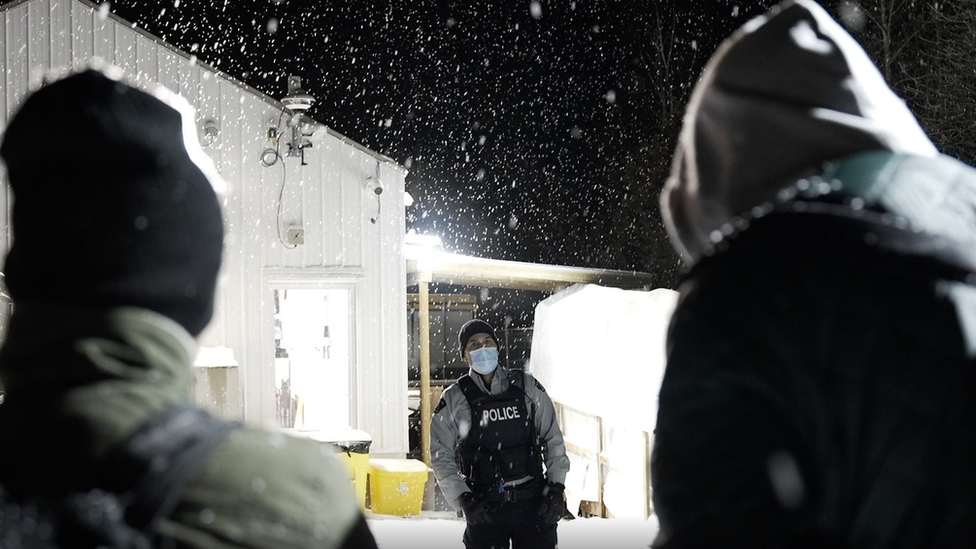
Under the health emergency measures implemented by the government during the covid-19 pandemic, the route was closed, but the demand for a safe haven never disappeared.
Thousands of asylum seekers returned when those measures were lifted 16 months ago.
Many come from Haiti, a country hit in recent months by political and gang violence. There has also been an increase in people arriving from Latin American countries such as Venezuela and Colombiaor from places as far away as Afghanistan.
At the same time, the Biden administration has extended some of the policies adopted during the pandemic by the Trump administration, such as the Title 42, a rule that allows border agents to reject migrants on the grounds that they could spread the covid-19 virus.
These measures have been used to block the entry by land of some migrants at the US-Mexico border.
Migrants who spoke to the BBC in Quebec, the province in which Montreal is located, said they are increasingly seeing USA as a non-viable country for refugees, where asylum claims can take years to be considered and where they feel unwelcome.
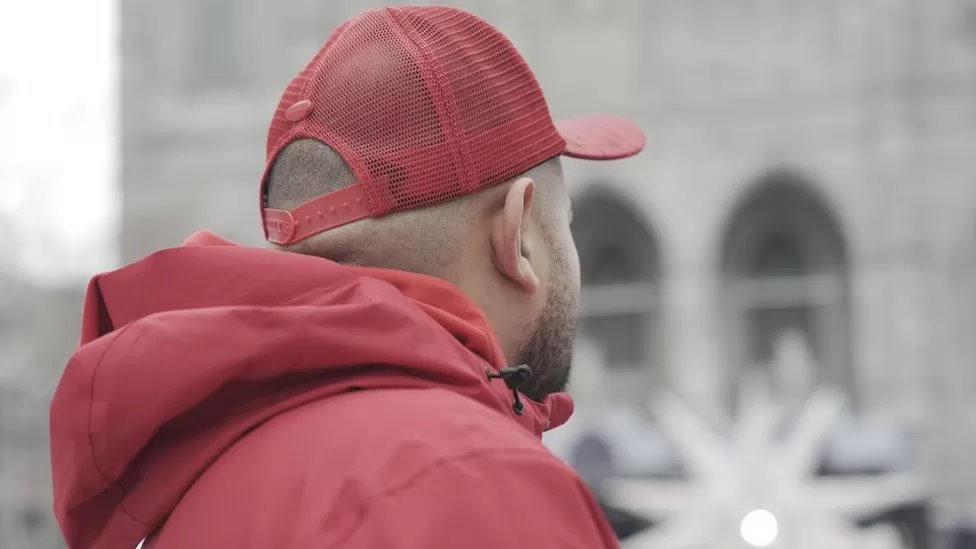
Joshua arrived in Montreal two days after Christmas and now shares a rented apartment with other migrants while he waits for his asylum application to be processed.
Originally from Venezuela, he had lived in exile in Chile for five years without travel documents, when he decided to start his trip to Canada.
“Other countries are not as friendly to irregular migrants,” Joshua tells the BBC (his name has been changed to protect his identity).
But Canada, he says, has welcomed him.
Agreement between the US and Canada
Behind the arrival of migrants is a nearly two-decade-old agreement between the US and Canada that requires migrants to apply for asylum in the first safe country they arrive.
A migrant arriving from the US will be turned away at the Canadian border but not at Roxham Road, because it is an unofficial crossing (this creates a legal vacuum).
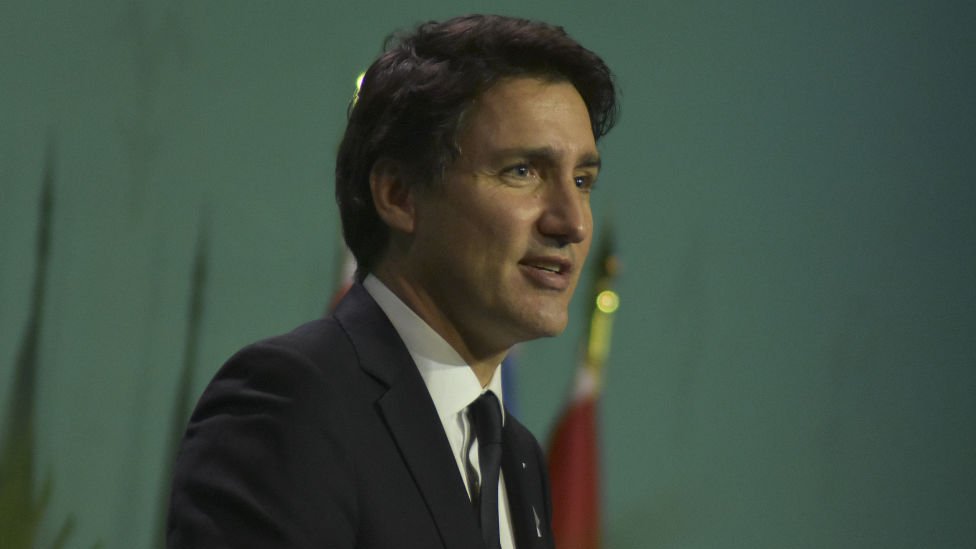
Trudeau dismissed calls to close the crossing, saying it would be futile given the thousands of kilometers of undefended border with the US and that migrants would attempt to cross dangerously elsewhere.
He has focused instead on renegotiating the deal, a topic he hopes to discuss with Joe Biden when he visits Canada this week.
However, the prime minister is facing pressure to take action as the arrival of new migrants increases the burden on social services especially in Quebec, where many of the migrants remain.
The Prime Minister of Quebec, Francois Legault, described the situation in the province of untenablesaying that social services were being “pushed to the limit” and that some immigrants are facing homelessness as a result.
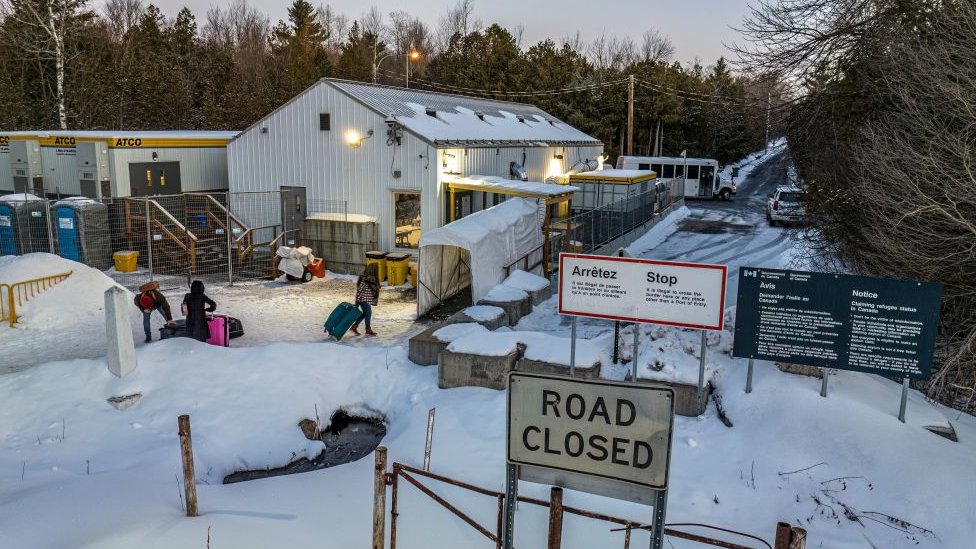
“It is becoming more and more difficult to receive asylum seekers with dignity,” he said in February.
Migrants are also facing a growing backlog of asylum applications, which rose from 56,300 in January 2022 to almost 71,000 in December, a 26% increase.
Applications can now take up to two years to process. Around 28% of all orders were rejected last year, which means that success is not guaranteed.
there are also long waiting for work permits.
It used to take a week for a new asylum seeker to get a social security number. Now the wait for an ID appointment is about two years, says Maryse Poisson, who works at the Welcome Center, an organization that assists newcomers in Montreal.
As a result, many migrants find it difficult to support themselves financially, and some have had to turn to food banks and receive other social assistance while they wait.
“We’re really concerned about the most vulnerable, those who have experienced trauma, those who have a lot of language barriers. They’re not getting the help they need,” Poisson says.
US border agents have noted an increase in people crossing back from Canada. In January, the US Border Patrol apprehended 367 people trying to cross from north to south, more than the number of such crossings in the last 12 years combined.
Since then, Republican lawmakers have talked about a “crisis” in the making on the northern border.
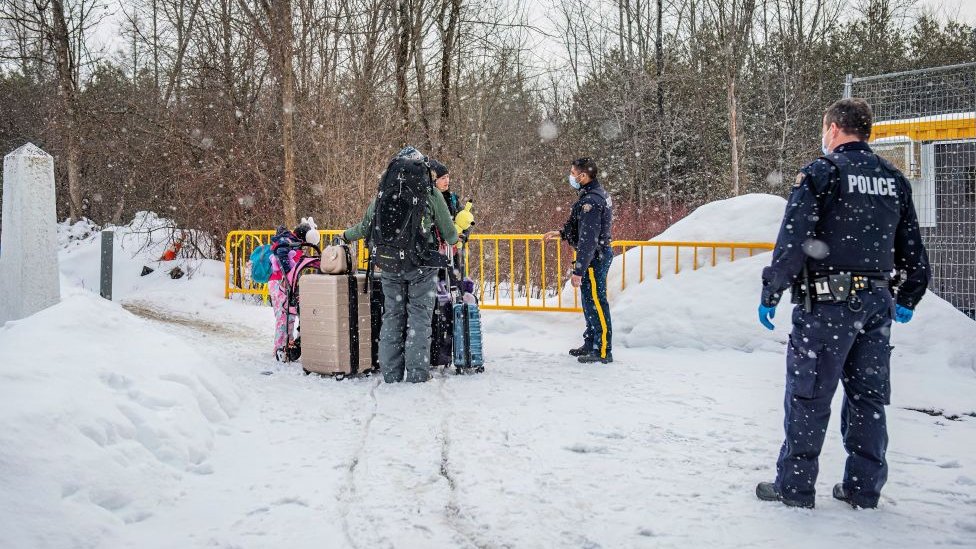
Some of those who return do so out of frustration at not finding work in Canada, or to reunite with family, say people who work with asylum seekers in Montreal.
Despite mounting challenges in Canada, migrants continue to cross the Roxham Highway in record numbers, and the harsh Canadian winter doesn’t seem to slow them down.
On the US side of the border, taxi drivers Terry Provost and Tyler Tambini say they often take people from the Plattsburgh bus station without charging them, as some migrants run out of money when they reach the end of the trip.
Once the migrants cross, they are met by members of the Royal Canadian Mounted Police, who warn them that they will be arrested if they cross.
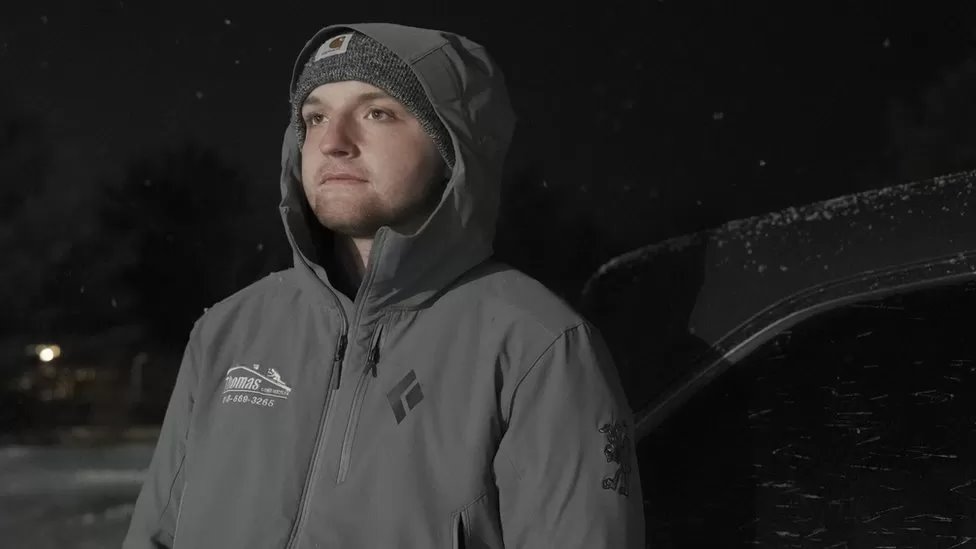
Since 2017 the Canadian side of the border has been turned into a small police complex, with spaces where crossers are processed and buses waiting to take new arrivals to nearby hotels.
Provost says he sees how people hesitate before taking the last step, not knowing what awaits them on the other side.
But for migrants like Joshua, Canada is the last safe place on the road.
“The American dream died many years ago,” he tells the BBC. “My new home is Montreal. The only home I have.”
Remember that you can receive notifications from BBC Mundo. Download the new version of our app and activate them so you don’t miss out on our best content.
